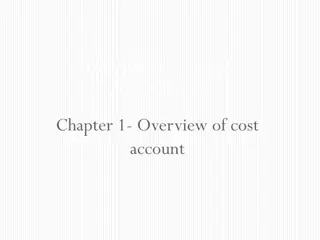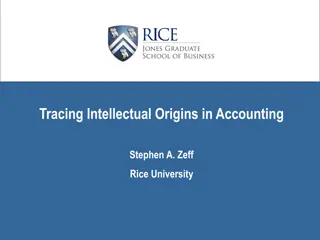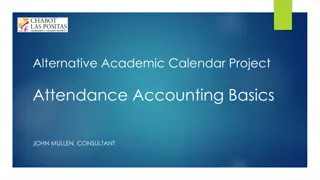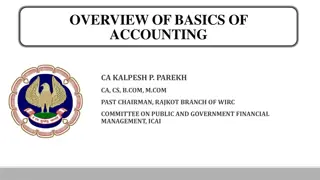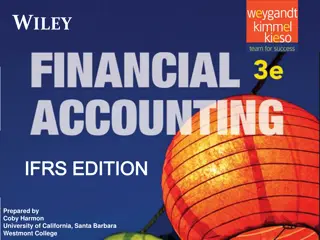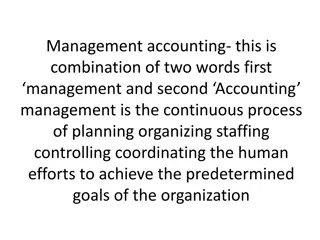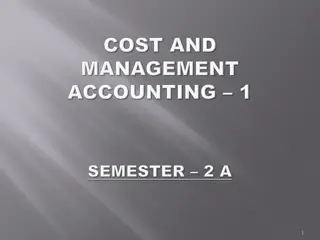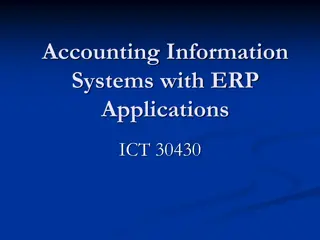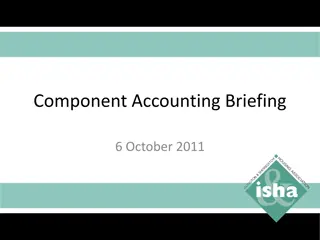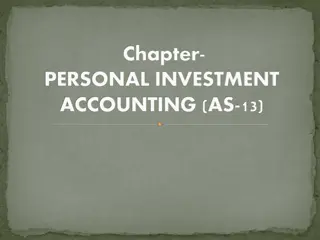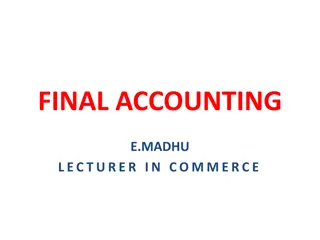Recent Accounting Case Law: Oraki v. Bramston (2014)
Appeal against Deputy Master Julia Clark's decision on the application to strike out Particulars of Claim and amend it in the case of Oraki and another v. Bramston and another in 2014. The case involves negligence allegations against chartered accountants and licensed insolvency practitioners regarding the conduct of respondents' estates, with a complex and unusual factual background of bankruptcy orders and solvent estates.
Download Presentation

Please find below an Image/Link to download the presentation.
The content on the website is provided AS IS for your information and personal use only. It may not be sold, licensed, or shared on other websites without obtaining consent from the author. Download presentation by click this link. If you encounter any issues during the download, it is possible that the publisher has removed the file from their server.
E N D
Presentation Transcript
Central London Small Practitioners Long Melford Conference 2014 Recent Accounting Case Law Grant Jones LLM. Chartered Accountant, Solicitor, New York Attorney, Licensed Insolvency Practitioner. Special Professor of Laws, Nottingham University. E gmjones@gmjones.org LinkedIn - http://uk.linkedin.com/in/accountantarbitrator (To download the slides, please go to the dropbox account on my LinkedIn page & to the CLSPG seminars folder & download slides available on this page).. 1
the slides There is no need to read the detail of these slides. I will skip you through these slides; death will be avoided. I will look to the underlined bits. The purpose of the detail is so you can take a considered look at your convenience later. It is my intention to skip through the case reports paragraph by paragraph 2
Oraki and another v Bramston and another - [2014] EWHC 2982 (Ch) - Chancery Division 12 September 2014 Particulars of claim - Amendment - Strike out - Defendant chartered accountants and licensed insolvency practitioners being trustees in bankruptcy of both claimants - Claimants bringing claim alleging negligence in conducting affairs of estate - Deputy master striking out and/or amending parts of particulars of claim - Whether deputy master erring. 3
This is an appeal against the decision of Deputy Master Julia Clark on 6th December 2013 on applications by the appellants to strike out the Particulars of Claim and by the respondents to amend it. She struck out some parts of the Particulars of Claim and permitted some of the proposed amendments. The appellants appeal, contending that she should have struck out the whole of the Particulars of Claim, and the respondents cross-appeal, contending that she should have permitted all the amendments proposed and allowed the Particulars of Claim to stand as drafted. The Particulars of Claim, in the form in which she allowed it, and showing what she had disallowed, is annexed to her order of 6th December 2013, but she seems in her judgment to have considered another form of Particulars of Claim with additional passages relating to damages. 1. The nature of the respondents' claim in the action is that the appellants, who are chartered accountants and licensed insolvency practitioners, and who were the trustees in bankruptcy of both respondents, negligently caused the respondents financial loss by the way in which they conducted the affairs of their estates. 4
2. The factual background is, as the deputy master said, both unusual and complex. It is unusual, in that the respondent were made bankrupt on, respectively, 1st September 2005 and 10th January 2006, and remained bankrupt for over 8 years, despite the facts that (a) the judgment on which the bankruptcy orders were based was flawed, and the respondents had suffered a miscarriage of justice and (b) both their estates were solvent throughout. The deputy master set out the detailed facts in her judgment, and it is unnecessary for me to repeat them. 3. To a large extent, the issues between the parties turned on two questions of law. First, it was submitted on behalf of the appellants that a trustee in bankruptcy could not owe any common law duty to the bankrupt outside section 304 of the Insolvency Act 1986. By that section, the court may order a trustee to repay, restore or account for money or other property where (inter alia) property has been misapplied or the bankrupt's estate has suffered any loss in consequence of misfeasance or breach of a fiduciary or other duty owed by a trustee of the estate in the carrying out of his function. However, this is "without prejudice to any liability arising apart from this section". . 5
4. The deputy master dealt with this in considerable detail between paras. 15 and 29 of her judgment, and concluded that, at least in a case such as the present, in which it is clear throughout that the assets of the estate far exceed the sums required to pay all creditors in full and the expenses of the bankruptcy, it is at least arguable that the existence of the surplus gives rise to a duty on the trustee's part to the bankrupt as the person who will be entitled to that surplus. I entirely agree with her on this issue. 5. Mr. Cloherty referred me to a decision of the Court of Appeal in James v. Rutherford Hodge [2005] EWCA Civ. 1580, in which Chadwick L.J. said at [12] that the bankrupt "...retained no beneficial interest in individual assets in the estate; and his right to share in the final distribution would arise only if they were a surplus after payment in full and with interest of all the creditors in the bankruptcy and the payment of the expenses of the bankruptcy". 6. That seems to me to support rather than undermine the view taken by the deputy master: if a trustee acts negligently, whether in relation to specific assets or otherwise, that may foreseeably cause loss to a bankrupt whose estate is likely to produce a surplus, as is the case here. Of course, it goes without saying that whether the trustee has been negligent must be judged in the context of his primary duty, which is, as the deputy master said "to get in, realise and distribute the bankrupt's estate in accordance with the statutory scheme provided for by the Insolvency Act 1986: section 305(2)". Also, of course, in judging the trustee's actions, regard is to be had to the funds available to him. 6
7. The second issue is whether, if the bankrupt is, in relation to any particular matter, in a position to apply under section 303 of the Act for the directions of the court, but does not do so, this absolves the trustee from any possible liability in relation to the matter. On behalf of the appellants, it was submitted that the trustee could not be in breach of duty if the bankrupt failed to apply to the court. Another way of putting it might be that, in such circumstances, any loss suffered by the bankrupt could be caused by his own failure to act. I do not find this argument persuasive; the effect of bankruptcy is, by definition, to deprive the bankrupt all his property and this may often (depending on his own personal ability to conduct court proceedings) have the practical effect of preventing him from complaining, or at least of making it very difficult for him to do so. In my view, it is at least arguable that the effect of a bankrupt's failure to seek the directions of the court on what would otherwise be negligence on the part of the trustee must depend on the particular facts of the case. 8. I was referred to the decision of the Court of Appeal in Heath v. Tang [1993] 1 W.L.R. 1421, a case in which it was held that the appellant bankrupt had no locus standi to institute an appeal against the judgment on which the bankruptcy petition had been bought. In that case, Hoffmann L.J. said at 1424e that the supervision of the insolvency administration by the bankruptcy judge protected the bankrupt from the injustice which might otherwise be caused by his inability to bring proceedings. That is of course true, but it does not seem to me to follow that the bankrupt's failure to apply to a bankruptcy judge would necessarily protect the trustee from liability for a negligent decision. 9. The deputy master held that it was appropriate for the court to focus its attention on the detailed circumstances of the case and the particular relationship between the parties in the context of the legal and factual situation taken as a whole, and for the court to do so only at a trial at which the detailed circumstances are established. I agree with that approach. She then went on to consider the specific matters pleaded in the proposed Amended Particulars of Claim. I agree with her on some matters but not on others, and I deal with the latter below. 7
10. The first matter is the claim (Amended Particulars of Claim paras. 8(b) and 12) that the appellants inflated the respondents' liabilities by seeking exorbitant fees. The deputy master dealt with this at paras. 34 and 35 of her judgment. I agree with her that the respondents should not be permitted to pursue this both in the present action and by an application in the Bankruptcy Court for an order reducing the appellants' remuneration but, if it is the respondents' case that exorbitant fees played a part in failing to bring the bankruptcies to an end expeditiously, then they should be permitted to pursue this part of their claim in the present action, and not through the separate application. They should be put to their election, but these paragraphs can only be struck out if they elect to pursue the separate application. A distinction is drawn as to why high fees are being attacked 8
11. Next, the respondents allege (Amended Particulars of Claim paras. 8(d) and 30-35) that the appellants have a duty to maintain properties in their possession or control and to maximise the income from such properties, and that in various respects they failed to do this. The deputy master held that there was no real prospect of establishing such a duty, because a trustee's duty was simply to get in and realise property: see paras. 37 and 46 of her judgment. I do not agree with this. It seems to me that, while a trustee is in possession of property, he may be under a duty to deal with it in a sensible and commercial manner, for example by ensuring that, until it was sold, it should be let. In the present case, the respondents allege that there was no need to sell the properties, or at least all of them, given the large surplus in the estate. I am not satisfied that this part of the claim has no reasonable prospect of success, and I would reinstate these paragraphs. 9
12. There is also a claim (Amended Particulars of Claim paras. 14 to 20) that the appellants wrongly accepted the claims of certain creditors. The deputy master said that the bankrupt's right to apply under Rule 6.105(2) of the Insolvency Rules to have the admission of the proof rejected, within 21 days after becoming aware of the decision, sufficed to exclude any additional common law duty arising in relation to acceptance of proofs by a trustee: see para. 40 of her judgment. For the reasons set out above, I do not agree with this. I do not think that it can be said, in advance of the trial, that there is no realistic prospect of success in respect of this claim, merely because the respondents' could have applied to the court but did not. 13. The deputy master also said, in relation to these claims, that no loss or damage is alleged to have been caused, but I think that she was wrong about this. Although not clearly pleaded, these paragraphs come under the heading (above para. 9) of "Failing to Bring the Bankruptcy's to an end Expeditiously". In a further iteration of the Amended Particulars of Claim dated 22nd November 2013, it is alleged that the consequence of this was that the respondent lost the opportunity to carry on with their property development business during the period of the delay. I am not clear in what form this allegation was before the deputy master but, in any event, the respondents should have been permitted an opportunity to amend to plead this. 10
14. The deputy master struck out paras. 21-6 of the Amended Particulars of Claim alleging that the trustees obstructed the respondents' attempts to obtain an annulment of the order for bankruptcy. I have considerable doubt about this part of the respondents' claim, but, unlike the deputy master, I would not go so far as to say that the respondents have no real prospect of success, and I would therefore restore these paragraphs too. 15. I also disagree with the deputy master's view that there is no realistic prospect of success for the claim for damages for mental distress. There is no authority, either way, on whether such a claim can be based on the negligent conduct of a bankruptcy leading to the bankrupt being left in that unfortunate condition for longer than necessary, and the point seems to me to be arguable. The discussion of the subject in McGregor on Damages, 18th ed. at 5-013, 5-5023 et seq. suggests that, in cases of tort causing economic loss, the court will apply a contractual analogy. The question may therefore be, would contractual liability for negligently looking after the claimant's personal financial affairs be one of the exceptional cases in which liability for mental distress would be allowable? 11
16. For these reasons, the respondents' cross appeal will be allowed in part. Needless to say, I express no view on the factual issues between the parties, which relate to the respondents' conduct as well as that of the appellants, but which cannot be resolved summarily on an application of this kind. 17. Finally, there are two points on which I would allow the appeal. The first is the allegation that the trustees failed to enforce a judgment against Birson Contractors Limited for 109,815.48 (Amended Particulars of Claim para. 27). I am told that this company had been dissolved before the appointment of either trustee; there is therefore no arguable claim and this part of para. 27 must be struck out. 18. Secondly, para. 42(a) of the draft amendment dated 22nd November 2013 (some form of which appears to have been considered by the deputy master) alleges loss of interest on the sum of 171,626, including an amount of 150,530.17 which the respondents allege should have been used to pay their debts so as to bring the bankruptcy to an end. Clearly, if this amount had been used in that manner, no interest would have been earned on it; therefore, the loss of interest claim must be struck out in so far as it depends upon the amount of 150,530.17. 19. I would be grateful if counsel would agree a form of Amended Particulars of Claim reflecting my decision on the appeal and the cross-appeal. 12
All England Reporter/2013/August/Caribbean Steel Company Ltd v Price Waterhouse - [2013] All ER (D) 74 (Aug) [2013] All ER (D) 74 (Aug) Privy Council Digest The claimant company manufactured, imported and traded in steel products for use in the construction industry. The claimant entered into a non-binding heads of agreement under which it agreed to subscribe for the new issue of shares in a company that manufactured and distributed cables and wire products (the company). Before going ahead with the acquisition, which amounted to 50.1% of the company's issued share capital, the claimant instructed the defendant firm of accountants to carry out a valuation of the company. The defendant took three approaches to its valuation, in the course of which it considered the effects of a surplus in the company's pension fund, which amounted to $13.8m according to a valuation provided to the company by a firm of consulting actuaries. The defendant explained, inter alia, that the pension surplus might be brought back into the company as an asset. At the date of the defendant's valuation, the company had borrowed sums from the pension fund, but that had not been recorded in the actuaries' report. The defendant had made no reference to the borrowing from the pension fund in its share valuation report, but it was accepted that the company's repayment liability would have been reflected in its liabilities in the company's financial statements used by the defendant in assessing its maintainable earnings. The instant proceedings arose out of a dispute as to how the defendant should have treated the pension fund surplus and the company's borrowings from the pension fund. The claimant claimed that the defendant had acted negligently by representing that the pension fund surplus had amounted to an asset of the company and had been available to it, and that the value of the pension fund had been materially depleted by the company borrowing from it. 13
The parties each relied on expert evidence; the claimant relying on an expert who was a certified fraud examiner, financial services auditor and forensic accountant, but not a qualified chartered accountant, and the defendant relying on an expert (H) who was a fellow of the Institute of Chartered Accountants of Jamaica. In his evidence, H stated that it was commonplace at the relevant time for pension plan surpluses to be used to reduce the company's contribution rate to the pension plan, so as to give the company a 'holiday', and that, in that event, the surplus could be seen as an asset. The trial judge found that the defendant was negligent in the valuation of the company in representing that the pension fund surplus could be brought back into the company and in treating that sum as an asset of the company. The judge found the defendant's contention, as supported by H, to have been unsound. He further held that, by failing to report the fact that the company had borrowed from the pension fund, that had also been negligent; the defendant ought to have realised the importance of the status and value of the surplus to the whole valuation exercise and the valuation had required 'the application of common sense' which did not 'require any expertise in share valuation'. That decision was overturned by the Court of Appeal of Jamaica, which held that, had the trial judge given due value and weight to the evidence of H, he would not have found that the defendant was negligent. The claimant appealed to the Privy Council. 14
The claimant submitted, inter alia, that the Court of Appeal had erred in substituting its views about the expert witnesses for those of the trial judge. The appeal would be dismissed. The trial judge's finding that the defendant's case that the pension fund surplus could have been brought back into the company as an asset was unsound, had been based upon a view of the judge that had not been put to H, and, therefore, the judge had not had the benefit of his response. The effect of the pension fund surplus was properly a matter for a professional opinion, based on accounting standards and practices at the relevant time. Further, the trial judge had been wrong to regard as a matter of obvious common sense that the defendant had been negligent, not requiring any expertise in share valuation. The fact that the defendant had called an independent expert to testify that, in his opinion, there had been no negligence, did not preclude the court from rejecting the expert's view and finding that there had been negligence. However, it was essential that the reasons given by the expert for reaching his opinion were carefully scrutinised because, unless there had been sound reason for rejecting it, the judge could not properly have found that professional negligence had been established. H had advanced reasoned grounds in support of his conclusion, and if the trial judge had given due weight to that evidence he would not have concluded that the defendant had been negligent (see [43], [46] of the judgment). 15
All England Reporter/2014/February/Rawlinson and Hunter Trustees SA and others v Akers and another - [2014] All ER (D) 200 (Feb) [2014] All ER (D) 200 (Feb) [2014] EWCA Civ 136 Digest The judgment is available at: [2014] EWCA Civ 136 In the context of proceedings seeking damages from the Serious Fraud Office, the judge decided that it was necessary and appropriate to make an order for disclosure of five reports prepared by the appellant chartered accountants and joint liquidators (see [2013] All ER (D) 357 (Jul)). The liquidators appealed on the basis that the judge had erred in finding that the reports were not protected by litigation privilege, relying on the witness statement of their solicitor, V. They contended that the judge had mischaracterised the proper approach, given the dual purposes of the reports to establish the financial position of the company and the possible need to take recovery proceedings. It fell to be determined whether the judge had erred in finding that the reports were not protected by litigation privilege. The appeal would be dismissed. 16
It was settled law that, for a communication to be subject to litigation privilege, it had to have been made with the dominant purpose of being used in aid of or obtaining legal advice from a lawyer about actual or anticipated litigation. Where litigation had not been commenced at the time of the communication, it had to be 'reasonably in prospect'. That did not require the prospect of litigation to be greater than 50%, but it had to be more than a mere possibility. The burden of proof was on the party claiming privilege to establish that the dominant purpose test was satisfied. A mere claim in evidence before the court that the document had been for a particular purpose would not be decisive. The court would look at 'purpose' from an objective standpoint, looking at all relevant evidence, including evidence of subjective purpose. The evidence in support had to be specific enough to show something of the deponent's analysis of the purpose for which the documents had been created and had to refer to such contemporary material as was possible without disclosing the privileged material (see [13] of the judgment). In the instant case, one passage of the judge's judgment suggested that he had mischaracterised the proper approach, in that an exercise to establish the financial position of a company did not need to be quite independent of the possible need to take recovery proceedings. However, he had not lost sight of the need, in every case, to identify the dominant purpose. Further, V's witness statement had made no effort to grapple with the obvious need to establish which dual or even multiple purposes had been dominant if a plausible claim to privilege was to be made out. His witness statement had fallen far short of establishing a claim to litigation privilege. There was no basis on which to legitimately differ from the judge's assessment that the dominant purpose test had not been satisfied (see [18], [22]-[26], [28], [29] of the judgment). 17
R (on the application of May) v The Chartered Institute of Management Accountants - [2013] All ER (D) 274 (Jun) [2013] All ER (D) 274 (Jun) [2013] EWHC 1574 (Admin) 10 June 2013 Digest The claimant was a member of the governing council of the defendant professional body, the Chartered Institute of Management Accountants (CIMA). In 2010, the claimant had circulated an email to a limited group of people in which she drew attention to a press article concerning Great Ormond Street Hospital (the hospital) and the alleged treatment by the hospital of a whistleblower. The Chief Executive Officer of CIMA (the CEO) was a non-executive director at the hospital and the claimant's email suggested that he should be required to resign his directorship of the hospital and make a statement disassociating himself with the hospital's alleged conduct. The CEO was made aware of the claimant's email and he wrote to the claimant, expressly marking his correspondence 'Strictly Private and Confidential', asking her to desist from sending further emails of that nature. The claimant responded to the CEO and then [forwarded her response, including a copy of the CEO's letter, to others. The CEO made a complaint to the President of CIMA and disciplinary proceedings followed. The claimant was found guilty of two charges of professional misconduct by the disciplinary committee. The appeal committee agreed with the conclusion of the disciplinary committee that the claimant had breached the CIMA code of ethics by failing to respect confidentiality (the confidentiality provision) and, in failing to do that, she had failed to act with integrity (the integrity provision) as was required under the code of ethics. The claimant challenged the appeal committee's decision by way of judicial review. 18
The claimant contended, inter alia, that the information contained within the letter did not have the necessary quality of confidence. The claimant further submitted that the appeal committee had been wrong to find that circulating the CEO's letter contrary to his express request amounted to a breach of the integrity provision. The defendant countered that the confidentiality provision did not demand respect for information that was confidential of itself, but merely respect for confidentiality or a mere request for confidentiality. The defendant further submitted that this was a new argument that the claimant was not now entitled to raise; it had not been before the disciplinary committee or the appeal committee. It fell to be determined: (i) whether the appeal committee had erred in finding the confidentiality provision to have been breached; (ii) whether the appeal committee had erred in finding that the integrity provision had been breached; and (iii) whether the claimant could rely on the contention that the letter did not contain confidential information when that had not been challenged in the disciplinary or appeal proceedings. The claimant's application would be allowed. 19
(1) The issue before the disciplinary committee and the appeal committee was not whether the claimant had been in breach of a common law duty of confidence, it had been whether she was in breach of the duty imposed under the relevant provision in the CIMA code of ethics. It was a necessary precondition of a breach of the duty under the confidentiality provision that the confidential information acquired by the claimant as a result of her professional relationship with the CEO should have been identified. The appeal committee had erred in treating the fact that the letter was marked 'Strictly Private and Confidential' as conclusive of the question whether there was a breach of the duty imposed by the confidentiality provision without asking itself whether the letter in fact contained confidential information which the claimant had acquired as a result of her professional relationship, and which she was bound to respect and not to disclose to third parties . (2) The appeal committee had placed enormous weight in its finding of a breach of the integrity provision on its finding that the claimant had breached the confidentiality provision. Having found that the decision in respect of the confidentiality provision was flawed, it would be unrealistic to disregard that error when assessing the appeal committee's findings that, by forwarding the CEO's letter, the claimant had breached the integrity provision. The finding in respect of the confidentiality provision affected the appeal committee's finding in respect of a breach of the integrity clause, and consequently the decision should be quashed. 20
(3) The fact that the claimant had not argued below that there was not a breach of the common law duty of confidence was related to the failure of the two committees to test the evidence against the requirements of the confidentiality provision and the specific need to identify confidential information acquired as a result of a professional relationship that was not respected and subsequently disclosed to third parties. It would be wrong to disregard what had proved to be the decisive point and allow an erroneous finding of the appeal committee to stand after full argument had been heard on the new and decisive point when no prejudice had been identified by the defendant. In those circumstances, the claimant would be allowed to rely upon the new point (see [129], [143], [146] of the judgment). 21
AER2014/April/Mehjoo v Harben Barker (a firm) and another - [2014] All ER (D) 13 (Apr) [2014] All ER (D) 13 (Apr) [2014] EWCA Civ 358 Digest The defendant was a firm of chartered accountants which had acted for the claimant in the provision of accountancy services and general tax advice. The claimant had established a successful retail fashion business which was an English registered company. There were plans to sell the company. The claimant wished to avoid paying capital gains tax (CGT) on the disposal of his shares. He held discussions with the defendant and two firms that offered tax advice. The possibility of using a bearer warrant scheme (BWS) was not suggested to him. A BWS aimed to change the situs of the shares prior to their disposal in order to take advantage of s 12 of the Taxation of Chargeable Gains Act 1992, which provided that individuals who were resident, but not domiciled, in the UK would not be charged in respect of assets situated outside the UK except insofar as the proceeds of sale were remitted to the UK. In March 2005, primary legislation came into effect which blocked BWSs. In the event, the claimant did not enter into a BWS. In April 2005, the company was sold for 22m. The claimant's share of the proceeds of sale was 8.5m. In August, the claimant, on the advice of a tax adviser, entered into a tax scheme known as a Capital Redemption Plan (CRP). The CRP was an artificial tax scheme designed to create a capital loss which could be set off against the relevant liability to CGT which it was sought to avoid. 22
HMRC challenged the effectiveness of the CRP and an agreement was reached between them and the claimant under which the loss produced by the CRP was disallowed and the claimant agreed to pay penalties and interest. The claimant issued proceedings against the defendant alleging negligence. As part of the claim, he sought to recover the fee and interest he had paid to the Revenue, but not the interest. He accepted that the defendant was a firm of generalist accountants and that he had never asked them to give him tax planning advice on possible ways of minimising or eliminating the CGT applicable to his disposal of the shares. However, he contended that, as reasonably competent chartered accountants, they had been obliged to have advised him that he had had, or very probably might have had, non-domicile status due to his Iranian origin which carried with it significant tax advantages and that he should have sought and obtained specialist tax advice. Had he received that advice, he would have instructed such a specialist and been advised to enter into a BWS which would have been implemented before such schemes were blocked. The judge held that the defendant had been negligent. He interpreted the defendant's retainer letter as not imposing any obligation on them to advise the claimant as to how he might minimise his tax liabilities unless they were specifically requested to do so. However, he found, on the evidence, that there had been a clear and mutually accepted understanding between the parties, based on a course of conduct, that the defendant had always been required to consider the claimant's best tax position and to give appropriate advice, including on how to reduce his tax liability, even when such advice had not been expressly requested. 23
In particular, the judge found that by October 2004, when a meeting had been held between the parties (the October meeting) to discuss (on the judge's findings) the CGT liabilities which would arise on the sale of the shares and how the claimant might reduce that liability, the defendant had come to share the claimant's expectation that they would give tax planning advice to the claimant even when not requested to do so. Furthermore, even if there had been no pre-existing duty before the October meeting, the defendant had assumed responsibility and therefore come under a duty to give tax planning advice because of the nature of the meeting. The obligation on the defendant to give tax planning advice to the claimant had included advising him that he was or might have been a non-domicile (based on the defendant's knowledge of the claimant's family history which had to have led them to realise that he had probably retained his Iranian domicile), which carried with it significant tax advantages, and that he should obtain tax advice from a non-domicile specialist. The judge awarded the claimant damages for the CGT he had been obliged to pay on the sale of his shares, the cost of entry to the CRP and the amount of interest payable on the CGT. The defendant appealed. The issued for determination were: (i) whether the judge had erred in having found that their retainer had extended to advising and assisting the claimant generally in relation to his tax affairs including CGT planning on the sale of the shares even when they had not been requested so to do; and (ii) whether the duty to give general tax advice at the October meeting could be said to have included a duty to give advice to the claimant that he was a non-domicile and that that status carried with it potentially significant tax advantages. The appeal would be allowed. 24
(1) The judge had correctly interpreted the retainer letter as having not imposed any obligation on the defendant to advise the claimant as to how he might minimise his tax liabilities unless they were specifically requested to do so. It was clear from the terms of the letter and from the context of the relationship that the defendant had been acting as general accountants to the claimant and his company. As such, they had been charged with preparing annual tax returns and with advising on the availability of reliefs in connection with their annual tax liabilities. Any more specialised services than that would have had to have been specifically requested and it would have been a matter for the defendant to decide whether, and if so, how such a request would be accommodated. It was established law that there was no such thing as a general retainer and any consequent duty of care depended upon what the professional was instructed to do. An accountant in the position of the defendant was not, therefore, under a general roving duty to have regard to and to advise on all aspects of the claimant's affairs absent a request to do so. The claimant had accepted that he had never asked the defendant to give him tax planning advice on minimising or eliminating the CGT applicable to his disposal of the shares. Under the terms of the retainer therefore, the defendant had not been required to give such advice. The defendant was not a specialist tax planner and had never offered to give the claimant such advice. A more extensive tax planning service than the conventional forms of tax planning advice listed in the retainer letter had been available only on request but had never been requested by the claimant. A fundamental variation in the terms of the retainer, as found by the judge, could not be inferred from any evidence that he had referred to. The judge's conclusion that the defendant had to have been taken to have assumed a positive duty to give tax planning advice by the time of the October meeting was not sustainable ( 25
(2) It had been common ground that the defendant had not been aware of the BWS or any other tax efficient means of changing the situs of the shares to foreign assets and that such knowledge would not have been possessed by a reasonably competent generalist accountant at the relevant time. The reasonably competent accountant setting out to advice the claimant of the tax consequences of the sale of the shares in an English registered company would not have been under any obligation to raise for discussion the claimant's domicile unless it had been relevant to the CGT liability of the disposal. The accountant would have known that it had given the claimant no tax advantages in relation to the sale of the shares unless the situs of the shares could have been changed. As that was something which the defendant had neither known or could have been expected to have known was achievable, there had been no reason to mention the matter still less a liability in negligence for not having done so. There had been no reason, still less any obligation, on the defendant to have raised the claimant's non-domicile status at the October meeting when the only issue for discussion had been the CGT payable on the disposal. The same applied to the contention that the defendant should have told the claimant that his probably non- domicile status had carried with it significant tax advantages. 26
Those had not been advantages available to the claimant on the sale of UK registered shares and, in the absence of any claim that the defendant should have known and advised the claimant that it would or might be possible to change the situs of the shares without triggering a charge to CGT in the process, it was difficult to understand why they had been under any legal duty to have brought the existence of those advantages to the claimant's attention. The competent accountant would not have believed that they had existed. There could not have been any duty on the defendant to have advised the claimant to consult a non-domicile specialist if the defendant, in the circumstances, had not been under a duty to draw to his attention any significant tax advantages derived from his status which might have been relevant to the sale of the shares. The defendant had alerted the claimant to the fact that various tax saving schemes might have been available. They had not known what those schemes were, nor could they have been expected to do so. The claimant had known about the tax charge and had chosen not to follow up on the availability of tax saving schemes. The defendants had discharged their duty. 27
Neutral Citation Number: [2014] EWCA Civ 1186 This is an appeal from the judgment and order of Mr Philip Marshall QC, sitting as a deputy High Court judge, on a preliminary issue in a dispute relating to a contractual expert determination of an amount to be paid for the sale of a share in a dental practice. The judge declared, contrary to the appellant's contentions, that the determination was not valid and enforceable. The appellant appeals. Mr Andrew Latimer represented the appellant, Mr Jonathan Bellamy represented the respondent. The dispute arose in the following way. The claimant and appellant, Ms Sophia Shafi, is a businesswoman who invests in and administers dental practices. The defendant and respondent, Dr Alexandra Rutherford, is a practising dental surgeon. In May 2007 the parties formed a company, the Shipley Dental Team Limited ("the company") in order to establish a dental practice. The parties each held 50% of the shares in the company and jointly owned the premises from which the practice carried on business. In order to establish the practice, a number of items of equipment were acquired under the terms of leases from Close Asset Finance, trading as Braemar Finance ("the Braemar leases"). 28
In 2009 the parties decided to part company. On 17 December 2009 the parties entered into an agreement ("the agreement"). By the agreement the appellant agreed to sell her 50% shareholding in the company and her 50% interest in the business premises to the respondent, leaving the respondent to continue the practice at the premises on her own account. The agreement required the respondent to pay 25,000 on completion. Thereafter the agreement contained detailed terms designed to enable the parties to work out the precise amount of the consideration and for resolution of any disputes on the completion account. A dispute arose concerning the proper treatment of the Braemar leases in the completion accounts. In due course this led to the appointment of Mr Richard Pughe, an independent chartered accountant, as an expert to resolve the dispute. In the company's accounts for the year ending 2008, the Braemar leases were apparently treated as operating leases and thus as giving rise to only a small amount to be taken into account as a liability. The expert concluded that the Braemar leases were not operating leases but finance leases, and therefore that they should be treated on that basis. However, he also concluded that he was prevented by the terms of the agreement from treating the Braemar leases in that way, and was bound to treat them as operating leases, contrary to the fact. He did not therefore have to determine a subsequent question which is what sums under the leases when treated as finance leases ought to be brought into account at the completion date. 29
I need to set out some of the terms of the agreement. By clause 4.1, the share consideration was 136,500 less 50% of all Completion Liabilities as calculated in accordance with Schedule 4 and detailed in the Completion Accounts, and further adjusted by reference to certain other matters which are not relevant. "Completion accounts" were defined in the agreement as: "The unaudited balance sheet of the Company, as at the Completion Date, and the unaudited profit and loss account of the Company for the period from the Accounts Date [which is defined elsewhere as 30 June 2008] to the Completion Date, prepared in accordance with Clause 6.""Completion liabilities" were defined as: "all liabilities of the Company as at the Completion Date net of all relevant receipts from the PCT, as calculated in accordance with Schedule 4 as detailed in the Completion Accounts, as agreed or deemed (as the case may be) pursuant to clause 6. That brings me to clause 6, which provided: "As soon as practicable following Completion ... the Buyer shall procure the preparation of the draft Completion Accounts by the Accountants on the basis of the requirements, accounting policies and accounting methods set out in Part II and Part III of Schedule 4."Clause 6.5.1 provided that the parties would attempt to resolve all matters in dispute, but in the event that they failed to do so by 31 March 2010 they could refer any matter in dispute to an independent expert accountant. Clause 6.5.2 provided: "In making such determination, such accountant shall act as an expert and not as an arbitrator and the decision shall (in the absence of manifest error) be final and binding on the parties."Schedule 4, Parts II and III of the agreement contained provisions governing the preparation of the completion accounts. 30
The provisions of Part II, so far as material, read: "1.2 The draft completion accounts shall:1.3 be prepared in accordance with the specific accounting policies and principles set out in Part III of this schedule so that, in the case of any conflict, such policies and principles shall override the provisions of paragraphs 1.4 and 1.5;1.4 subject to paragraph 1.3, be prepared in accordance with the accounting policies, principles, practices and procedures adopted by the Company in the preparation of the Accounts, which include the policies set out in paragraphs 1, 2, 3 and 5 of Part III of Schedule 4, so that, in the case of any conflict, such policies, principles, practices and procedures shall override the provisions of paragraph 1.5;1.5 where none of the accounting policies, principles, practices or procedures referred to in paragraphs 1.3 and 1.4 deal with the matter, be prepared in accordance with generally accepted accounting principles in the UK as applicable to small companies as at the Completion Date."The proper construction of paragraph 1.4 of Part II of Schedule 4 is at the heart of this appeal. In paragraph 1.4, "the Accounts" is a defined term, which means, according to Clause 1.1, "the financial statements of the Company, prepared in accordance with the Act and the FRSSE as applicable to small entities for the accounting reference period ended on the Accounts Date." The accounts date is further defined as 30 June 2008. "The Act" is the Companies Act 2006 and FRSSE means Financial Reporting Standard for Smaller Entities. We have seen the accounts prepared by the company's accountant, Morris & Co, to 30 June 2008. They contain an express statement that they have been prepared under FRSSE. Under the heading "Accounting Convention", they state that the accounts have been prepared under the historical cost convention and in accordance with FRSSE effective at January 2007. They are in the short form permitted by Part VII of the Companies Act for small companies. One does not learn from them anything express about the treatment of the Braemar leases, which are not mentioned in the accounts. 31
Part III of Schedule 2 went on to provide some specific matters in accounting. In particular, paragraph 2.1 provided: "In the calculation of the Completion Liabilities, liabilities shall include any and all sums paid at or payable by reference to the period up to and including the Completion Date including but not limited to [certain specific matters]."Pursuant to the agreement, exchange and completion took place on the same day, whereupon the appellant transferred her 50% shareholding and 50% beneficial interest to the respondent and the respondent paid 25,000 on account. The respondent has continued to trade from the premises. Morris & Co produced two sets of draft completion accounts for the period ended 16 December 2009: one in May and one in July 2010. The draft accounts treated the Braemar leases as operating leases not finance leases, in the same way as had been done in the company's 2008 accounts. The parties did not agree either set of accounts; it does not matter why. This led to the appointment of Mr Pughe. The joint letter of 2 March 2011 appointing Mr Pughe as expert included the following: "Our respective clients are parties to the Agreement. They cannot agree on the balance of the Consideration to be paid for the sale and purchase of Ms Shafi's shares in the Company. The disagreement revolves around those items which are assets and liabilities of the Company and whether the prepared accounts comply with the accounting terms and policies of the Agreement, and as such, whether they are to be included in the Completion Accounts. Terms of Appointment.Pursuant to Clause 6.5.1 of the Agreement, it has now become necessary to refer the matter to an Independent Accountant to resolve this dispute, subject to strict reference to the Agreement to the parties' wish to jointly instruct you in this matter on the following terms:1. Upon you accepting this appointment, the parties shall make written submissions to you within seven days of such appointment becoming effective, on the issues of:1.1 The Completion Liabilities and assets of the Company as provided for in the Agreement."There were two other matters, but they are not relevant. 32
The letter also instructed Mr Pughe as follows: "Your decision on the matters you are asked to determine shall be final and binding on the parties."The parties attached the May and July 2010 draft completion accounts to their joint letter of instruction, as well as the Braemar leases and the company's accounts for the periods 2007 to 2009. The parties made written submissions to the expert. The appellant submitted that the Braemar leases were for equipment for the company's business and rental payments had always been discharged by the company as the equipment was used by the company. They were thus properly omitted from the balance sheet because they were operating and not finance leases. A meeting was held between the expert and the parties' representatives on 10 May 2011, following which the expert reported to the parties in part as follows: "Completion liabilities. We all agreed that the overriding accounting policies under the Agreement are in Part III of Schedule 4.The Completion Liabilities are dealt with in clause 2.1 which states 'liabilities shall include [and he sets it out]. We agreed that if I were to determine that the leases are operating leases, then they would not properly fall to be deducted from any calculation of consideration under the Agreement. If I were to determine that the leases are Finance leases, the issue is whether the future payments due are 'payable by the reference to the period up to and including the Completion Date'. Please include in your submissions clarification of this clause."On 21 June 2011 the expert wrote again to both parties. In his letter, he explained that he considered that the Braemar leases were finance not operating leases. Thus their treatment in the company's June 2008 accounts, as well as in the draft completion accounts, was wrong and did not comply with FRSSE. 33
He said that his interpretation of the agreement was that he could not amend the June 2008 accounts, yet it was impossible for a determination to be made under the terms of the agreement when the accounts which are, as he said, the starting point for the agreement, are not FRSSE-compliant. He asked for the June 2008 accounts to be amended to treat the Braemar leases as finance leases, or for the parties to agree that he could amend the accounts himself to treat the leases as finance leases. The expert's conclusion that he needed to amend the June 2008 accounts was based on his interpretation of the agreement, namely that he was bound to treat the leases in the way treated there unless and until the company's June 2008 accounts were amended. The parties did not agree to either alternative suggested by the expert. The appellant's position in her letter of 1 July 2011 was that the Braemar leases had been properly treated as operating leases and the expert had to follow that treatment. On 4 July 2011 the expert issued his determination. His findings were: i) He had discussed the matter of the Braemar leases with the company's accountants who now accepted they were finance and not operating leases. They had never previously seen full copies of the leases; ii) His determination was accordingly that the Braemar leases were finance leases and the 2008 accounts had not been properly prepared under FRSSE; iii) There was no mechanism under the agreement for him to amend the 2008 accounts, although they had not improperly prepared, and according to him formed the basis of the agreement; iv) Accordingly he could not take account of any lease liability. The expert proceeded to determine the share consideration under these constraints. 34
The claimant considered that, applying the expert determination, a sum of nearly 70,000 was payable to her. The respondent did not accept that the expert's determination was enforceable. The claimant consequently issued proceedings against the defendant seeking a declaration that the defendant was bound by the determination. On 19 April 2013 His Honour Judge Raeside ordered a preliminary issue to be tried, namely "whether the determination of Richard Pughe is valid and enforceable so as to bind the parties." It was this issue which came before the deputy judge. The parties did not file any witness statements, but simply made written submissions based on the documents. The main issue between the parties therefore concerns the proper construction of paragraph 1.4 of Part II of Schedule 4. The appellant says that the expert was right to interpret it as requiring him to treat the Braemar leases in the same way as they had been treated in the 2008 accounts. The respondent says that the expert wrongly interpreted his mandate or instructions: paragraph 1.4 did not require him to carry forward an incorrect treatment of the Braemar leases. 35
The deputy judge concluded that: i) (paragraph 12 of the judgment) the question of how the Braemar leases were to be categorised and the impact of that upon the completion liabilities was a matter that came within the scope of the expert determination and in particular within paragraph 1.1 of the letter of instruction; ii) (paragraph 12 of the judgment) the completion accounts should have taken account of the proper treatment of the Braemar leases applying FRSSE, given that they were to be prepared in accordance with the accounting policies, principles, practices and procedures adopted in the preparation of the accounts, such accounts having been expressly stated to have been prepared on the basis of FRSSE; iii) (paragraph 13 of the judgment) when clause 1.4 refers to "the accounting policies, principles, practices and procedures adopted in the preparation of the Accounts," it was referring to the policies etc used by the profession generally on which those accounts are stated to be drawn up, not to the way in which the company has actually applied those policies; iv) (judgment paragraphs 14 to 15) the argument that the parties should be taken to have negotiated the figure of 136,500, taken as the starting point for the consideration on the basis that there had been correct treatment of the Braemar leases, and that it was therefore incorrect and unfair to treat them differently when calculating liabilities, should be rejected. It was equally possible that the parties may have arrived at a figure on a somewhat imprecise basis in the agreement, and then embarked on a more precise adjustment process to arrive at what is intended to be the correct figure. In that context, the significance of the starting figure lacked force; 36
v) (judgment paragraph 15) a much stronger commercial argument was that the parties cannot seriously have expected the expert to proceed on the basis that, although the previous set of accounts were expressly stated to be prepared according to a particular policy, and that policy was erroneously applied, one then ignores the correct implementation of the policy; vi) (judgment paragraph 17) the expert had committed an error in considering he was prevented from embarking on the task of applying the correct policy. This was an error in interpreting his jurisdiction, or, putting it a different way, was a material departure from the scope of his instructions. The error justified the intervention of the court. The judge was, if necessary, prepared to have gone further and hold that the expert committed a manifest error. In the light of his conclusions, the judge did not have to decide the question whether the report was "final and binding", given the reservation in paragraph 1.5 of the report, but he doubted whether it was final or binding. The judge accordingly decided the preliminary issue by declaring that the expert determination was not valid and enforceable. On this appeal, the appellant says that the expert did not commit the errors which the judge found. The respondent supports the judge on those issues and, in the alternative, raised the lack of finality by her respondent's notice. 37
In his written submissions, Mr Latimer repeats the arguments which the judge rejected, namely: i) that the figure of 136,500 in clause 4.1 represents the bargain struck between the parties on the basis of the annual accounts of the company in their possession, which were prepared on the basis that the Braemar leases were operating leases ii) that paragraph 1.4 of Part II of Schedule 4 means the policies adopted in fact, not those which might have been adopted, and that the judge had erred in adopting the construction which he did. Mr Latimer expanded on the construction of paragraph of 1.4 in the following way. He relied heavily on the fact that the clause required the application of practices as well as policies, principles and procedures. What would be the point, he asked, of including the word "practices" if it was not the parties' intention to add something to those other words? He also relied heavily on the use of the word "adopted" contending that it must mean adopted in fact. He also submitted that the judge elevated paragraph 1.5, which relates to general accounting practice, above the earlier and more specific paragraph 1.4 when he should have done the reverse. There are a number of specific answers to these points. Firstly, the word "practice" is just as apt to refer to a rule as it is to something actually done "in practice". Accountants commonly make statements of accounting practice, by which they mean statements of the rules used in conducting the accountancy exercise. Those who remember the old Rules of the Supreme Court will know that it was referred to as the Supreme Court Practice and later the Senior Court Practice. It is a set of rules. Secondly, the place of the word "practice" in the paragraph, as it is after "policies" and "principles" and before "procedures", is consistent with practices and procedures being used to fill in gaps not resolved by policies and principles. I reject the suggestion that the more specific word "practices" must govern in the case of conflict with policy. One only has to think of an error consisting in adding a zero to a sum in the accounts repeated year-on-year to see why that cannot be so. 38
Thirdly, I would not attach the weight which Mr Latimer seeks to attach to the word "adopt", which seems to me to be, putting it at the best from his point of view, neutral. The question is whether it means "purported to be adopted" or "stated to be adopted" on the one hand or "adopted in fact" on the other. I am also not persuaded by Mr Latimer's point about paragraph 1.5. It is based on paragraph 13 of the judgment where the judge said this: "It seems to me when referring to accounting policies, principles practices and procedures in paragraph 1.4 in Part II of Schedule 4, the agreement is referring to matters of policy or practice or procedure within the accounting profession generally, which the company has stated that it is expressly adopting for the purposes of its financial statement."Mr Latimer has, it seems to me, seized rather unfairly on the judge's use of the term "accounting profession generally" when read in context, what he is referring to is the accounting policy, practice or procedure which the company has stated that it is adopting in its financial statements. Viewed in that way, the judge is not giving priority to general methods of accounting over paragraph 1.4; he is simply doing no more than applying 1.4 itself. I think without intending the least disrespect to Mr Latimer's well sustained submissions, the question can be asked and answered at a rather higher level. What, against the relevant factual background, were the parties using the language of paragraph 1.4 to mean? Did they mean the liabilities of the company should be computed by reference to correct accounting policy, supplemented if necessary by reference to practices adopted, or did they mean that they should be computed according to such policies except where contradicted by the actual treatment of those liabilities in the 2008 accounts, whether that treatment was right or wrong? In my judgment, the judge was right to accept the first of those alternatives for essentially the reasons he gave. 39
The completion accounts were to provide the final adjustment between the parties of the consideration for the sale of the shares. For my part, I can see no reason why in those circumstances they would have wished to carry forward erroneous accounting treatment of liabilities. Rather, they would have been seeking to reflect, at least so far as the liabilities are concerned, the reality of the situation. It is true that the agreement had started off from a roughly negotiated figure of 136,500, from which the liabilities were to be deducted, and that it may have been the case that reliance by the parties was placed to some degree on the company's accounts in arriving at that figure. Whether they did in fact, we do not know. But, like the judge, I do not find that consideration as compelling as the considerations which favour the respondent's construction of the agreement. There was no dispute that if the expert was wrong to conclude that his computations were constrained in the which he concluded they were, then this was a case in which it was appropriate for the court to intervene. It is therefore not necessary to decide between the alternatives of misinterpreting jurisdiction and manifest error. In the result, I would for my part dismiss the appeal. I would leave the judge's order directing a fresh determination on the correct principles in place. 40
thank you, as... save for ........ 41



